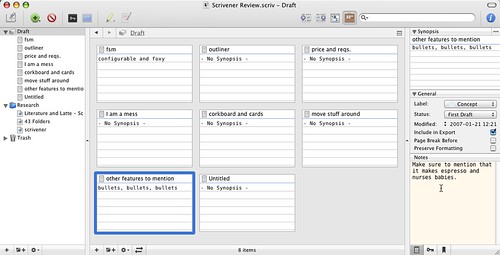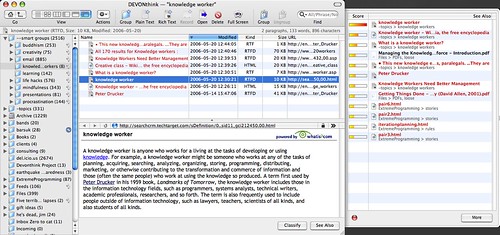Merlin’s weekly podcast with Dan Benjamin. We talk about creativity, independence, and making things you love.
WritingMaking friends with paper (again)Merlin Mann | Oct 22 2007I really enjoyed this video presentation by Michael Wesch on how we make, find, and share information in a world where we've shed the idea of paper as our sole medium for storage and communication -- where ideas can munge and mix freely, thanks to digital collaboration. Gorgeous. Now, of course, as a fan of paper for certain kinds of work, I always feel like jumping in at this point to defend our pulpy little friend from what sometimes turns into a blanket party. read more »12 Comments
POSTED IN:
Guy Kawasaki & the art of the 5-sentence emailMerlin Mann | Jul 12 2007Ten Things to Learn This School Year I'm intrigued by this bit of advice from Guy Kawasaki on the stuff you don't learn in school (but should):
While exaggerated for effect, this strikes me as sound advice. And, in the context of a discussion about education, I'm reminded of the "hamburger essays" we used to have to write in school. Yeah, sure, there aren't many times in life where you have to sit down and write an actual 5-paragraph essay, but they sure did encourage you to think about structure, rhetoric, and arc. As ever, that bit of constraint gives you the focus needed to improve the quality of your presentation. Man, in retrospect, I've sent a lot of emails that could and should have been whittled down to five sentences (if that). Emailarrhea. POSTED IN:
Blogs: Watching passionate thoughts evolve (in public)Merlin Mann | Feb 15 2007 The Blogging Church A few months back, Brian Bailey asked me to contribute a short essay for his new book, The Blogging Church: Sharing the Story of Your Church Through Blogs (neat idea for a book). As I'm sure Brian realized at some point, a lot of the advice in the book (creating an online image, deciding who the blog's for, and improving your blog over time) will also be of interest to small business and garden-variety bloggers. I enjoy Brian's writing and think he has a sound grasp on what makes blogs work (or not). Good stuff, and red meat for anyone thinking of taking their church (or their business or their kittens) to the web. Here's an excerpt from what I sent him. read more »POSTED IN:
Scrivener: Powerful OS X app for writersMerlin Mann | Jan 21 2007Literature and Latte - Scrivener Scrivener, a full-featured writing program that I've been raving about a lot lately on MacBreak Weekly, has now reached the 1.0 milestone and is available for purchase from Literature and Latte. Scrivener's product page has also been updated with a terrific explanation of why this app feels so different. Personally, I like the excellent fullscreen mode, built-in (round-trip) outliner, tricked-out Inspector, and all-in-one form factor, but my favorite feature (which can be hard to explain without actually using the app for yourself) is Scrivener's use of the index card and corkboard metaphor. If you write like I do (and I pray that you do not), you have a messy approach to drafting that is iterative, intuitive, and far from linear. You do a brain dump, then type a little, then research a little, then type a little more, then move a bunch of stuff around, then groan aloud, then 80% start over and so on until something is done. Yes, it would be more tidy if we all followed the mandate of our elementary school teachers and wrote perfect 5-paragraph essays straight from a completed outline. But, such is life. And Scrivener seems to get that. read more »POSTED IN:
W. H. Murray on the power of startingMerlin Mann | Dec 31 2006I've finally gotten around to reading The War of Art by Steven Pressfield. It'd been recommended to me numerous times over the past few years -- most recently and publicly by David Allen during our podcast episode about procrastination. I'll save a full review of the book for another time (hint: ala, Bird by Bird, it's a terrific tonic for procrastinating artists), but I can't think of a better way to welcome 2007 than by sharing this quote, which Pressfield borrows (p.122) from the Scottish mountain climber W. H. Murray:
Happy new year, kids. Start something cool. POSTED IN:
6 powerful "look into" verbs (+ 1 to avoid)Merlin Mann | Oct 15 2006In one of the recent podcast interviews I did with David Allen, we talked about procrastination and how he tries to get people -- especially knowledge workers -- back to just "cranking widgets." I love this term, because, in his humorous way, David captures how any thing we want to accomplish in this world eventually has to manifest itself in an intentional physical activity. Seemingly over-huge super-projects like "World Peace," "Cancer Cure," or "Find Mutually Satisfying Vehicle for Jim Belushi" all still come down to physical actions, such as picking up a phone or typing an email. And David is wise, in that interview, also to highlight the importance of what he refers to as a "'look-into' project," which just means that even deciding if a project is interesting and useful to undertake can be a project in itself. It also means that, even with an outcome of "deciding," that meta-project still consists solely of physical actions. In this case, it's the physical actions that help you locate the additional information you'll need to make a timely and wise decision about whether to proceed at all. In sum, no matter what, it all still should come back to widgets and how they get cranked. Like a lot of you, I've struggled with how you turn "thinky work" into physical action widgets, but here are a few of my favorite task-verbs to get you started in the right direction. They're presented here in a rough approximation of the order in which I use them in my own "look-into" projects: read more »POSTED IN:
Percolating your blog draftsMerlin Mann | Aug 24 2006Let Your Blog Posts Marinate (4 Steps to Forming Great Ideas) at LifeDev Good advice on developing a tunnel for how you draft stuff that will eventually go on your blog. I think #3 ("Let it develop") -- while it could benefit from a bit more explanation -- is the really interesting part. Try not posting immediately, and return to the draft later on:
5ives: The text file behind the curtainI do something similar with 5ives, where this kind of process is really conducive. I have a running, two-year-old collection of ideas, partial lists, orphan titles and lots of "one fun line I could build a good list around." Goofy as many of them are, some actually sat around since the site began until they evolved to the exact choices, wording, and order that I liked. Tip: Use text foldingSince this kind of collection method can get messy (over 100 partial piles of junk in one text file), I like to use text folding inside TextMate. This makes it easy to "roll up" lists in such a way that just the title shows, then you can individually click a little "reveal" arrow to see the hoisted contents. Something like this (note the arrows in the gutter):
The beauty part is that I can still append text to the bottom (or prepend to the top) using Quicksilver since it's all just plain old text. Neato. [ via Gina on Lifehacker ] POSTED IN:
WriteRoom: Free full-screen writing app for OS XMerlin Mann | Jun 30 2006O, how we distraction-prone people pine for persistent and ubiquitous full-screen mode. And it looks like the good folks at Hog Bay have come up with an elegant freeware app to help save the beleaguered writer from him or herself. read more »POSTED IN:
DEVONthink: An appreciation of "smart groups"Merlin Mann | May 22 2006I've recently gotten way back into DEVONthink as a means to capture, wrangle, and analyze all the reference material in my world. If you're new to this amazing application -- and at the risk of far exceeding my understanding of both the human brain and this particular piece of software -- DEVONthink learns the neural pathways between the stuff you know or say is related. But, more importantly, it prompts you on the relationships you probably don't know exist (yet). This is awfully useful and wildly stimulating to the busy front parts of my own brain, such as it is. I'd seen the power of the app before and have been way inspired by how the heroic Steven Johnson is using it, but the learning and experience curves always seemed just a bit steep for me, given the returns that it yielded in my too-brief usage. Still, I was quite smitten with the concept. Flash forward a year and a half. I've now had DT Pro v. 1.1.1 in battlefield action for the last few weeks, and have been dutifully feeding it anything I find that seems tangentially interesting or useful; a few custom Quicksilver triggers mean one-click, no-look addition of any data type, from web pages to text selections to photos, full PDFs, and movie files. Thus far, this includes stuff like:
My focus over this time has been strictly on capture, rather than trying to make anything particularly useful of it all just yet. But I've recently started grouping and classifying occasional clusters of content using the app's killer feature: really smart AI that finds associations between items based on a concordance of common words and similar previous relationships you've established. So, I have the start of a potential post underway that will re-introduce DT in more detail (which I've been building right in DT, natch), but I was moved today to share the insane usefulness of DEVONthink's "Smart Groups." read more »POSTED IN:
Turning procrastination into your shitty first draftMerlin Mann | May 17 2006Are you procrastinating? Or are you just thinking? | Gadgetopia I think Deane's insights on procrastination and programming might actually be even more true of writer's block and for many of the same reasons. But perhaps unlike coding, the gestation period of a writing project almost always benefits from a series of very small starts. While there are dozens of tricks for psyching yourself out of a perceived writing slump, you eventually learn that blocks are sometimes there for a theoretically plausible reason -- because you really haven't figured out what you're trying to say yet, but suffer crippling anxiety and dread about even committing the "shitty first draft." So, as with the programming example, your brain beats itself up for being such a laggard and you may stay locked in creativity-sapping inaction. But the truth is you're probably working on it already. The only way to find out is to start someplace. Anyplace. As Neil Fiore wisely points out in his excellent book, The Now Habit, we usually have more than enough information to just start most any job. Don't begin by fussing about perfection or the "right" place to start, just start. You can get help midwifing the process through tools like outlines, mind maps, or talking to a duck. But, if you've truly procrastinated even getting to the point where proper gestation and idea seeding can begin, you're understandably in a bit of trouble. Because now you have to go straight to producing the artifact (the code or the article or whatever) while your brain still craves that extra bit of time to turn it all over. Like they say, a pregnancy takes nine months, regardless of how many women you've put on the job. Don't slip on a deadline that makes you try to make an infant in one night. read more »POSTED IN:
|
|
| EXPLORE 43Folders | THE GOOD STUFF |





